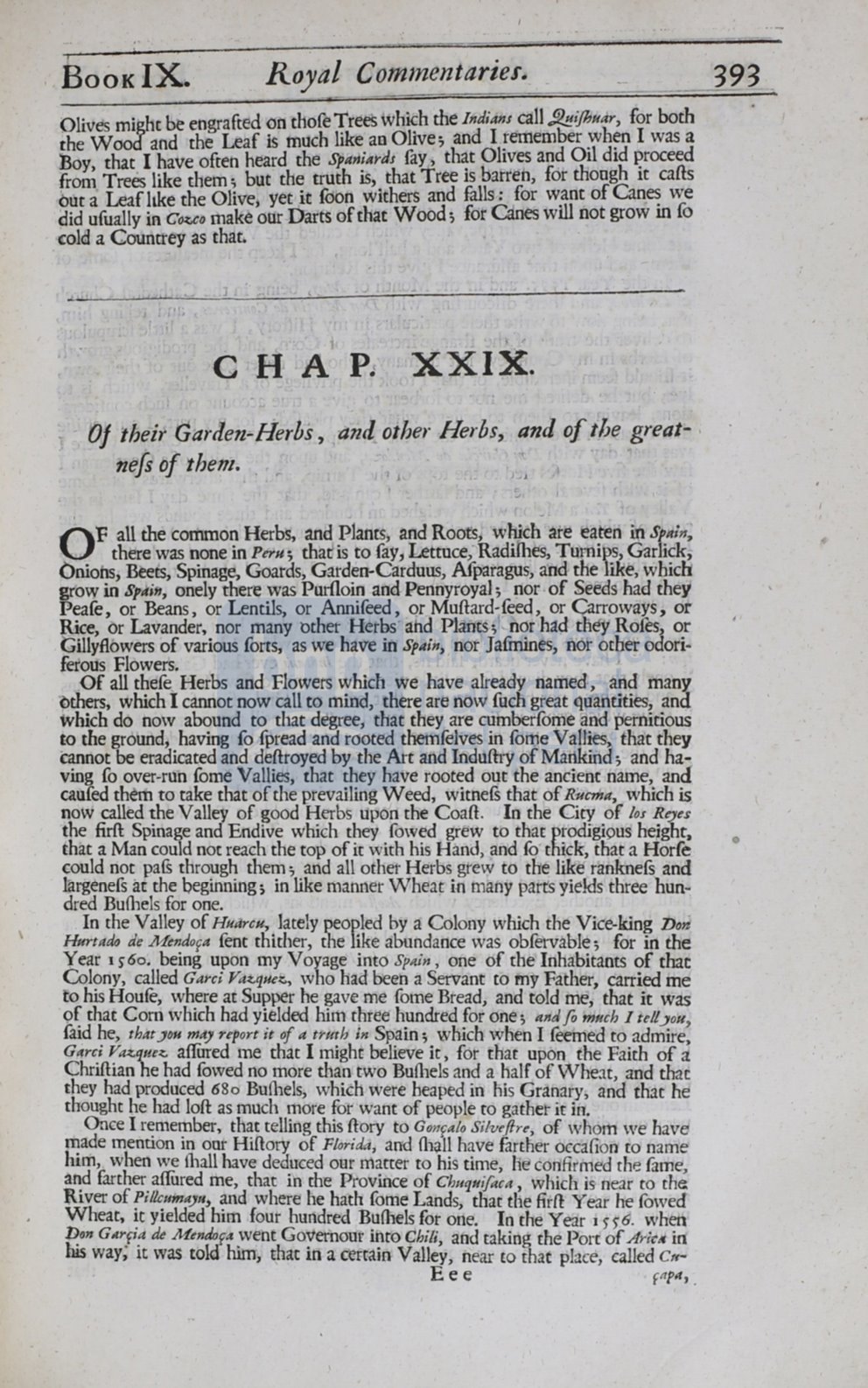

I
.. BooKIX.
Royal
Commentaries.
Olives
might be
engrafted
<1n
thofeTrees Whkh the
Indian.1
call
~ifhuar,
for
both
i:he
Wood
and the
Leaf
ls
much
like
an Olive;
and I
:emember
;:va~n
I was
a
:Boy,
that
I
have
often heard the
Sp_ania~d.1
fay, that
Olives and
011
did }?toceed
from Trees like
them:;
but the
truth
is,
that
Tree
ls
barren,
for thoagh
1t
cafis
out
a Leafhke
the Olive, yet
it
fuon
Wi~hers
and falls,.: for w_ant of
Can~
we
did ufually
ia
Co;c;co
make onr
Darts
of
that
Wood; for Canes
will
not grow m
fo
coldl a
Counttey
as
thttt.
OJ their Garden-Herbs, and other Herbs, and of the great-
·
ne'S of'
the"l·
.
r ,..
'.)J
'J
).., J
0-
F all the
common
Herb~
and Plants, and
Roofs, which
ate
eaten
in
Spmn~
there
was
none
in
Peru;
thar
is
to
fay')
uttnce, RadUhes,
TUfflips,
Gar1kk,
Onions,
Beets,
Spinage, Goards,
Garden-Carduus, Afparagus, a'nd
the like, which
grow
in
SptiifJ,
onely
nhere was
Purfloin
and
Pennyroyal; nor of Seeds had
they
Peafe,
or
Beans,
or
Lentils,
or
Annifeed, or
Mufiard-feed,
or Carroways, or
I\ice, or
Lavander,
nor
many bther Herbs ahd
Plants;
ndr
fotq
they
Roles,
or
Gillyflowers of various
forts,
as we
hav-e
in
Spain,
not
J
afinines,
nor ocher
odori-
ferous Flowers.
-
Of all thefe.
Herbs
and Flowers which
we
have
already
name-cl, and many
others, which
I
cannot
now call to mind, there are now foch
great
quantities,
and
which do
now abound to
that d<egree, that they are curnberfome and
pernitious
to
the ground,
having
fo
fpread
and
rooted
themfelves
in
forne
VaU~
ihat
they
cannot
be
eradicated and defiroyed by th€
Art
and Indufuy of
Mankind;
and ha–
ving
fo
over-run fome Vallies, that they have rooted out the ancient name,
and
caufed
them
to
take
that of the
prevailing
Weed, witnefS that of
R11cma,
which
is
now
called
the
Valley of good Herbs
up0n
rhe Coa{t.
lo
the
Cicy
of
lo.r
Reyes
the
firft
Spinage and &tdive
whi<;h
they
fowed
grew
to
that
prodi~9us
height,
that a Man could not reach the
top
of
it
with
his Hand, and fo
thick,
that
a Horfe
c-0nld
not
pa£S
through
them ; and all othet Herbs gr€w
to
the
like ran1mefs
and
largenefs
at the
beginning; in like manner
Wheat in
many
part'.s
yields
three
bun..
dred Builiels
for
one.
In
the Valley
of
Huarcu,
lately
peopled
by
a Colony
which the Vice-king
Don
Hurtado de Mendofa
fent thither, the like abundance was obfervabie; for
in
the
Year
1
s
60.
being upon
my
Voyage into
Spltin
,
one
of the Inhabitants of
that
Colony, called
Garci
J/azque~,
who
lia-d b'e€n a Servant
co
my
Father, carried
me
to
his
Houfe, where
at
Supper
he
gav€ m€
fome
Btead,
and
told
me,
that
it
was
9f
that Corn
which
had yielded
hlm
tnree
hundred for
one;
and
fo
much I tell
yo11,
faid he,
that
you
m""J -nport
it
of
a tN1th in
Spain ; which when I feerned to admire
Garci
Vaz.que~
affured me that I might believe
it,
for that
upon the
Faith
of~
Chrillian he had fowed no more than
tw0
13uiliels
and a half of
Wheat,
and thac
they had produced
68
o
Bufh€ls, which were heaped in
Dis
Granary,
and that
he
thought he
had
loft as much more for want
of
people to gather
it:
in.
Once
I
r~me~ber, th~t
tdling
this
fiory to
Gtr11falo
Silveftre,
of whom we have
made mention m our Hdl:ory of
Florida,
aad
~ll
have farther occafion
to
name
him,
when we
!hall
hav€ deduced
om
matter to
his
time,
li~
confirmed
the fame,
and farther affured me, that
ih
the
Province of
Chuquifaca.,
which
is
near
to
the.
River of
Pillcumayu,
and
where
h€
hath
fome Lands that
the
firll: Year he fowed
Wheat,
~c
yielded him fout hundred
Bufhels
for otle.
In
che year
1
5 )6.
when
D_on
G11r.rz~de
.Mentfafa
.w~nt Go~ernour
iht0
Chit.;,,
and
taking
the Port
of
Ar-ic111
in
his
way,
it
was to1'i him, that
in
a
C€r~ain
Valley, near to that place, called
Cu·
Ee e
p1p1t, .
393
' '














